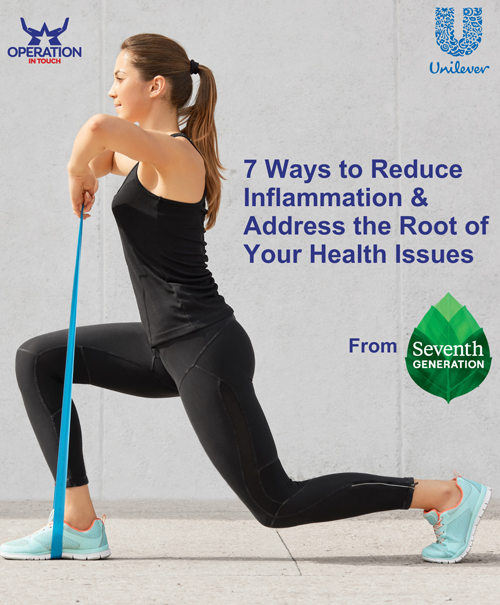
7 Ways to Reduce Inflammation and Address the Root of Your Health Issues
Cellular inflammation in the body is now thought to be at the root of most common chronic illnesses in modern society. Because of this, many experts believe that chronic inflammation may essentially be the leading cause of death in the United States. That is a BIG DEAL! The good news is if there is a common root to our rising heath problems (inflammation), then there may also be a common solution (a hint, it is not popping aspirin on a daily basis). We can treat the root cause of the problem by understanding the ways in which we create cellular inflammation on a regular basis and consequently reverse that process through shifting some of our lifestyle habits. Anything we can do to keep inflammation at bay (and there is a lot we can do) will help us prevent disease, live longer, and feel healthier.
The Good, the Bad, and the Ugly of Inflammation
Inflammation is not all bad. In fact, inflammation is the body’s attempt to protect itself by removing harmful substances, like damaged cells, irritants, or pathogens, and to initiate the healing process. Acute, short-term inflammation is the body’s way of healing itself by bringing nourishment and immune activity to a site of injury or infection. This process brings about the familiar signs and symptoms of inflammation: local redness, heat, swelling, and pain in the affected area of the body. It is the body’s natural healing response. However, when inflammation is stimulated on a prolonged or chronic basis, when no threat is present, its effects on the body become more complicated. The constant production of immune cells resulting from this effect no longer serves a specific purpose, and can result in tissue damage and illness. Unproductive, chronic inflammation is triggered by:
- Poor Diet (highly processed foods, refined sugar, omega-6 fatty acids, trans-fats, unknown food sensitivities)
- Microbial Imbalances (of course!)
- Chronic Stress
- Exposure to Harsh Chemicals and Toxins
- Sedentary Lifestyle
- Poor Sleep Habits (less than 7 hours a night)
- Loneliness (yes, even loneliness).
Don’t Be Fooled—Inflammation is Often Unperceivable
Unfortunately, chronic inflammation itself typically does not produce noticeable symptoms until actual loss of function occurs somewhere in the body. Chronic inflammation often manifests at imperceptible levels, silently damaging our tissue over an extended period of time. This process can go on for years without being noticed, until seemingly out of nowhere we are diagnosed with a serious condition or disease. Chronic illnesses occur often after a lifetime of inflammatory damage.6 The slow onset of disease is problematic in that people often do not make the connection between their ongoing poor health habits and low-grade symptoms or the condition that “appeared out of nowhere.” It is hard to see our bad habits as problematic if we don’t notice detrimental damage until it’s too late.
When I was a freshman in college, I suffered from body aches and pains as well as general fatigue. After perplexing many doctors, I was finally diagnosed with Fibromyalgia. Fibromyalgia is a common diagnosis given to people who have generalized pain of unknown origin. I was put on muscle relaxers for comfort. The muscle relaxers did a great job of making me want to sleep much of the day and negatively affecting my engagement in school. I accepted the Fibromyalgia diagnosis and treatment for several years. Later, motivated by a book I read about the harmful effects of sugar and processed foods, I eliminated refined sugars and highly processed foods from my diet. When I made these changes, my daily aches and pains vanished.
The aches and pains I was experiencing were the result of the inflammation my body was experiencing from the sugar and processed foods that I was eating everyday. I do still get aches and pains when I eat a significant amount of “junk food,” but my bigger litmus for inflammation these days is an acne breakout. When I am not taking care of myself and engaging in habits that are pro-inflammatory my face is the first to show it. My acne dissipates when I recommit to anti-inflammatory eating and lifestyle habits. Instead of merely despising my acne and feeling like a victim, I now see breakouts as a message from my body saying “you better get it together—you’re killing me in here.”
7 Ways to Reduce Inflammation
- Choose Anti-Inflammatory Foods: Food can either trigger or prevent inflammation. I’m excited to give you a pro-inflammatory and anti-inflammatory food list next week when I share how to use food to put out inflammatory fires—stay tuned! It is also important to identify food sensitivities, because consuming food to which the body is having an immune reaction will undoubtedly cause inflammation (even if the food is typically considered anti-inflammatory).
- Balance Your Microbes: We spent the month of September talking about the importance of a balanced microbiome to overall health. An imbalance in friendly flora will cause intestinal irritation and inflammation. Keep in mind that inflammation and intestinal flora have a reciprocal relationship—inflammation causes microbial imbalances and microbial imbalances lead to inflammation.
- Manage your Stress: Stress’ affect on cortisol is a huge contributor to inflammation. If we can reduce stress (and high levels of cortisol) we can reduce cellular inflammation. We will discuss how stress affects inflammation in detail in a couple of weeks.
- Move Your Body: A sedentary life has been shown to contribute to many unwanted health outcomes—inflammation included. Find time to move your body throughout the day. Sitting at a computer all day and working out for 30 minutes every night has been shown less effective for overall health than regular movement throughout the day. If you have a sedentary job find ways to get up and move throughout the day—stand up or walk around the office during phone calls, advocate for movement during meetings, go to the printer or fax machine whenever able, take a walk during lunch and breaks, use stairs versus elevator, etc.
- Reduce Exposure to Harsh Chemicals and Toxins: Strive for an organic and chemical free diet. Drink filtered water when possible. Use cosmetics that are free of irritating and carcinogenic additives (like pthalates, coal tar, talc and parabens). Identify chemical exposures in the home (cleaning supplies, plastics, garden supplies) and the workplace (chemical exposures, fumes, inhalants, radiation) and swap for more natural, plant-based options.
- Get Adequate Rest: Research is showing strong links between sleep loss and inflammation. Adults need 7-9 hours of sleep a night in order to fully restore the body.
- Connect in Relationship: The “love hormone” oxytocin (released during sex, cuddling, massage, holding hands, and emotionally connecting) is a natural anti-inflammatory and the experience of loneliness is pro-inflammatory. So get your oxytocin fix daily!
Read the original article by clicking here. (Link opens in new window.)


